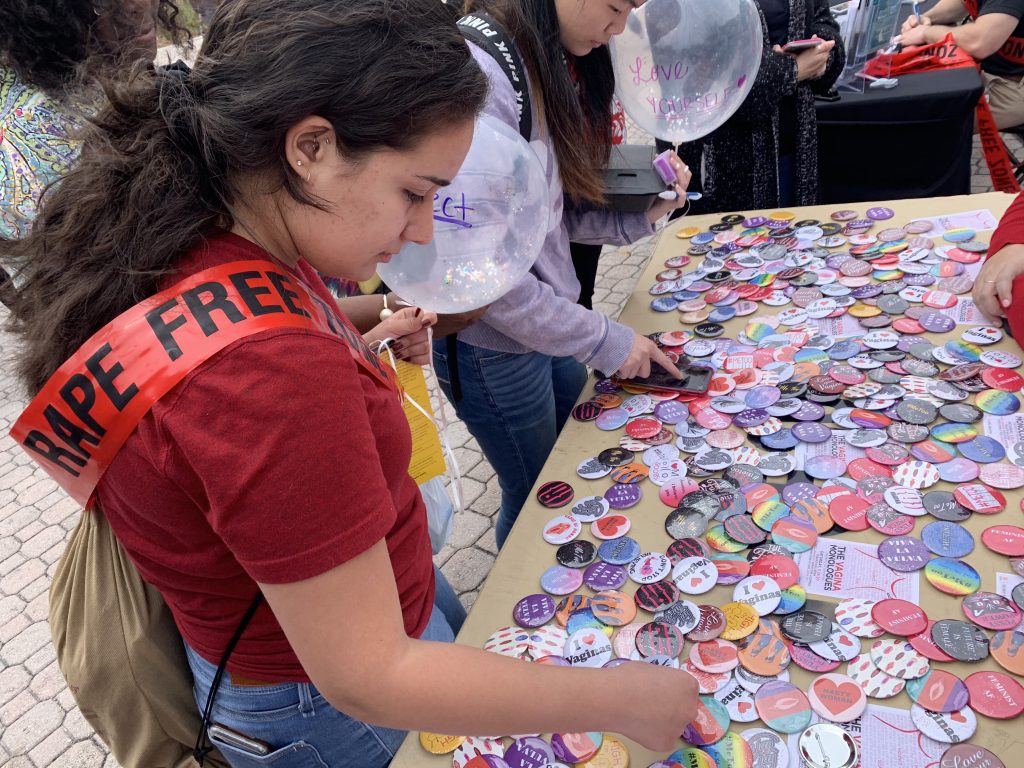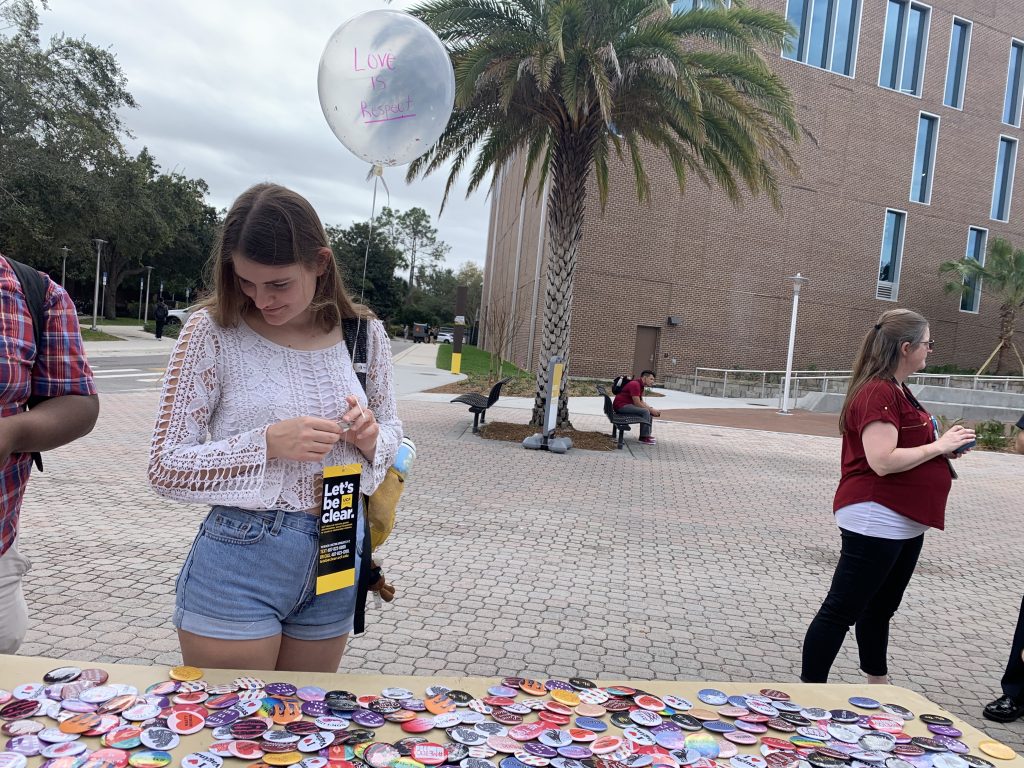Although Valentine’s Day is traditionally spent celebrating love, one group of activists spent the afternoon outside of the UCF Student Union bringing awareness to violence and injustice against women through sharing stories.
One Billion Rising — a global event where female survivors of violence have a safe space to stand up and speak out — allowed the survivors of violence, and the people closest to them, to have an opportunity to tell their story on Feb. 14 at UCF’s main campus.
“Every February, we rise – in countries across the world – to show our local communities and the world what one billion looks like and shine a light on the rampant impunity and injustice that survivors most often face,” the website reads.
One in three women will be beaten or raped during her lifetime, according to the One Billion Rising’s website. The website states that with the world population at 7 billion, that adds up to more than 1 billion women and girls.
The campaign’s website states it is a call to action to end violence against women, including cisgender women, transgender women, and any individuals who are victims of gender-based violence.
Green Dot — UCF’s bystander intervention program — along with UCF Victim Services and other campus organizations brought this campaign to the Student Union patio on Valentine’s Day.
“One billion rising is part of a greater movement called V-Day, redefined to stand for vagina, and to celebrate and empower women which is why it’s on Valentine’s Day,” Green Dot facilitator Davina Caldwell said. “It has a double meaning: get in touch with yourself and love yourself.”
Caldwell said that this event was aimed to spread awareness about abuse and violence against women everywhere while also encouraging students to seek help from all the facilities available on campus.
Emily Rodrigues, senior political science major and survivor of violence who spoke at the event, said she was raped at a fraternity house on UCF’s main campus in 2016.
“It feels very personal,” Rodrigues said. “I heard someone explain it as, ‘In a room full of people, explain the best sex you’ve ever had.’ You would obviously be very uncomfortable — and now, if you imagine explaining what it was like to be raped, it’s a million times worse.”
Rodrigues said many individuals blame themselves for what happens to them and think it’s their own fault.
“When drinking is involved, you think it’s your fault because you think you drank too much,” Rodrigues said. “Even if drinking is not involved, you still might blame yourself and question ‘why I put myself in that position’ or ‘why did I trust this person?’”
Rodrigues said that while coming out and asking for help in such situations is very hard, the criminal justice system and the process can make it even harder.
“When I reported this incident, I had to play the role of a perfect victim — very reserved and conservative,” Rodrigues said. “You have to pretend to be someone else to prove that you didn’t deserve to be raped.”
Rodrigues said when she filed a civil lawsuit against the individual, the authorities asked her various invasive questions, such as to list all the men she slept with, or if she had ever sent any personal pictures to anyone.
“When they started asking me those questions I was frustrated,” Rodrigues said. “It made me so angry that I had to prove I didn’t deserve something like that, and that your answers can actually sway the court to believe that you were asking for it.”
Rodrigues said she eventually dropped the lawsuit because sharing her story was very empowering for her.
“The court creates a narrative for you and being able to speak here and share my story the way I wanted to was so important for me, instead of conforming to what they wanted,” Rodrigues said.
UCF spokeswoman Courtney Gilmartin said in a Tuesday email the university established a starting point for reporting via a text or phone line 24/7 to UCF Victim Services as part of the Let’s Be Clear Campaign in January 2018.
Gilmartin said these efforts were to bring more visibility to reporting options and support resources at UCF.
“Sexual violence is a societal reality, and UCF is not immune to that,” Gilmartin said in the email. “We encourage survivors to come forward because it allows us to connect them with resources for support, and, if they wish, work to hold perpetrators accountable.”

While some people are able to overcome their discomfort to share their stories openly, sophomore biomedical sciences major Isabelle Delgado said she came to show her support and ensure no one felt like they were sharing their story alone.
“I think sometimes you have to fight through that discomfort to stand with other people,” Delgado said. “It’s so hard to go through something this difficult — and it’s even harder to go through it when you think you’re alone.”
While some had a personal connection to this event, others came out to support the cause and were seen wearing sashes that said, “Rape free zone” and holding pins with messages such as “Pussy Power” and “The future is female.”
Students were also holding balloons that said, “Love is respect.”

“I think that a lot of times people can use the word ‘love’ to justify things that shouldn’t be justified, and when you use the term ‘love’ in that way, you’re not respecting the person’s boundaries and their wishes,” Delgado said.
Delgado said she also had a message for all the perpetrators out there in the world:
“You are touching someone’s life, and you could be changing them forever — and that’s a really big deal,” she said. “So you need to make sure if you do change someone’s life, it’s for the better.”
There are campus, local, regional, and national resources dedicated to supporting survivors of sexual harassment, sexual assault, relationship violence and stalking, according to Let’s Be Clear’s website.
More information about confidential resources on campus can be found on the “Immediate Steps” section of the Let’s Be Clear website.




